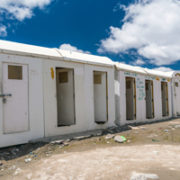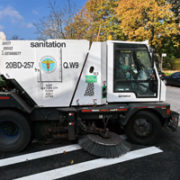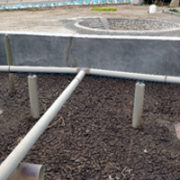Tag Archives | sanitation
Sanitation, Water
 Sanitation, Water
Sanitation, Water
 Environment, Water
Environment, Water
 Environment, Water
Environment, Water

The sanitation economy: Digging for treasure

In both respects, sanitation is deeply embedded. Grids of sewer pipes have been fixed into the surface of cities in the developed world for more than a century, and it has become a strong and important part of most policy makers’ belief that this is how to provide sanitation. Or, despairing of such systems ever being built in developing countries, some have swung to the opposite view, advocating off-grid solutions, which, while less embedded in the ground, become an equally strong and important part of their proponents’ beliefs.
Evidence-based capacity building can inspire policy makers to accelerate sanitation interventions in Asia

National and local governments in Asia are facing significant challenges to effectively deliver access to sanitation, as well as to properly collect, transport, dispose of, and treat fecal sludge. Actions taken by governments at present have been to implement large-scale sewer networks, which are prohibitively expensive, and which take years to plan and build. To address the growing challenges and requirements of sanitation, many cities are using a combination of on- and off-site sanitation solutions provided by a range of service providers comprising civil society partners, private companies, and municipalities or utility companies.
Composite Water Management Index: A pathway to solve the water crisis in India

The National Institution for Transforming India (NITI Aayog) and, more importantly, the citizens of India have acknowledged that the country is undergoing the “worst water crisis” in its history—and they are making commendable efforts to address it. They have proposed a comprehensive index to create awareness and to enable effective water management for the Indian states. In June 2018, NITI Aayog, the premier think tank for the Government of India, proposed the Composite Water Management Index, a tool to assess and improve the efficiency of water resource management.
“Commitment” as a success factor for fecal sludge management

Leh, a high-altitude cold desert in India, is a popular tourist destination hosting around 250,000 visitors annually. At present, the poorly designed septic tanks and soak pits installed by households, hotels, and guesthouses to contain fecal sludge are posing a serious threat to groundwater contamination. To cater to the demand for fecal sludge management (FSM), the Municipal Committee of Leh (MCL) partnered with a private company called Blue Water Company (BWC) and a technical nongovernment organization named BORDA in 2017 to provide an end-to-end FSM service, including pit emptying and operation of a sludge treatment plant.


Search
Subscribe / Connect to Asia Pathways
Subjects
- Accelerating Progress in Gender Equality
- Addressing Remaining Poverty and Reducing Inequality
- Agriculture and natural resources
- Capacity development
- Climate change
- Economics
- Education
- Energy
- Environment
- Finance sector development
- Gender
- Governance and public sector management
- Health
- Industry and trade
- Information and Communications Technology
- Infrastructure
- Making Cities More Livable
- Miscellaneous
- Population
- Poverty
- Private sector development
- Regional cooperation and integration
- Sanitation
- Social development and protection
- Strengthening Governance and Institutional Capacity
- Subjects
- Transport
- Uncategorized
- Urban development
- Video Blog
- Water
Recent Posts
- Investing in Childcare a Win for Women and the Economy
- Flush and Flourish: Upgraded Toilets Can Transform Lives in Rural Asia
- New Ways for Climate Finance and Development in Asia and the Pacific
- Rethinking High-Rise Living: Balancing Urban Growth and Sustainability in Asia’s Cities
- Navigating Linear Transport Infrastructure Through Conservation Landscapes




Recent Comments